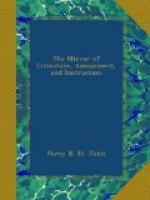[Is, in our estimation, a splendid failure. It lacks the variety which the Annual should possess for a family of readers; and its sameness is, moreover, of the saddest character in the whole region of romance. The stories are long, and lazily told; and they overflow with the most lugubrious monotony. There is scarcely a relief throughout the volume, from Wordsworth’s “majestic sonnet” on Sir Walter Scott, to Autumn Flowers, by Agnes Strickland; we travel from one end to the other, and all is lead and leaden—dull, heavy, and sad, as old Burton could wish; and full of moping melancholy, unenlivened by quaintness, or humour of any cast. Not that we mean to condemn the pieces individually; but, collectively, they are too much in the same vein: the Editor has studied too closely his text-motto:
“Fairy tale to lull the heir,
Goblin grim the maids to scare.”
It is all shade, without a gleam of sunshine, if we except two or three of the most trifling of the papers. The best tale in the volume is the Marsh Maiden, by Leigh Ritchie; next is the Jacobite Exile and his Hound: Retrospections of Secundus Parnell, are an infliction upon the reader; and these, with two mediocre tales, and a sketch or two, make up the prose contents. The poetry has greater merit, though almost in one unvaried strain. Mr. Watts has contributed but one lyric, and Mrs. Watts a stirring ballad of Spanish revenge; Mary Howitt has contributed a fairy ballad, pretty enough; and the Sin of Earl Walter, a tale of olden popish times in England, of some 60 or 70 verses. We quote two specimens from the poetry:]
SONNET ON SIR WALTER SCOTT’S QUITTING ABBOTSFORD FOR NAPLES.
By William Wordsworth.
A trouble, not of clouds, or weeping rain,
Nor of the setting sun’s pathetic
light
Engendered, hangs o’er Eildun’s
triple height:
Spirits of Power assembled there complain
For kindred Power departing from their
sight;
While Tweed, best pleased in chanting
a blithe strain,
Saddens his voice again and yet again.
Lift up your hearts, ye Mourners! for
the might
Of the whole world’s good wishes
with him goes;
Blessings and prayers, in nobler retinue
Than sceptred king or laurelled conqueror
knows,
Follow this wondrous Potentate. Be
true
Ye winds of ocean and the midland sea,
Wafting your charge to soft Parthenope!
THE SKELETON DANCE.
After the German of Goethe.
The warder looked out at the mid-hour
of night,
Where the grave-hills all
silently lay;
The moon-beams above gave so brilliant
a light,
That the churchyard was clear
as by day:
First one, then another, to open began;
Here came out a woman—there
came out a man,—
Each clad in a shroud long and white.




